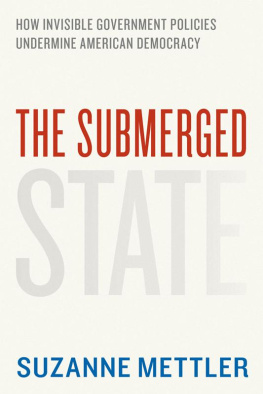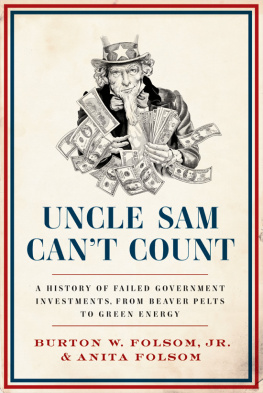SUZANNE METTLER is the Clinton Rossiter Professor of American Institutions at Cornell University. Her most recent book is Soldiers to Citizens: The G.I. Bill and the Making of the Greatest Generation.
The University of Chicago Press, Chicago 60637
The University of Chicago Press, Ltd., London
2011 by The University of Chicago
All rights reserved. Published 2011.
Printed in the United States of America
20 19 18 17 16 15 14 13 12 11 1 2 3 4 5
ISBN -13: 978-0-226-52164-0 (cloth)
ISBN -10: 0-226-52164-8 (cloth)
ISBN -13: 978-0-226-52165-7 (paper)
ISBN -10: 0-226-52165-6 (paper)
ISBN -13: 978-0-226-52166-6 (e-book)
Library of Congress Cataloging-in-Publication Data
Mettler, Suzanne.
The submerged state: how invisible government policies undermine American democracy / Suzanne Mettler.
p. cm. (Chicago studies in American politics)
Includes bibliographical references and index.
ISBN -13: 978-0-226-52164-0 (cloth: alk. paper)
ISBN -10: 0-226-52164-8 (cloth: alk. paper)
ISBN -13: 978-0-226-52165-7 (pbk.: alk. paper)
ISBN -10: 0-226-52165-6 (pbk.: alk. paper) 1. United StatesSocial policyPublic opinion. 2. Public welfareUnited StatesPublic opinion. 3. United StatesPolitics and governmentPublic opinion. 4. AmericansAttitudes. 5. United StatesSocial policy. 6. Public welfareUnited States. 7. United StatesPolitics and government21st century. 8. DemocracyUnited States. I. Title.
HN 59.2. M 485 2011
320.60973dc23 2011017776
 This paper meets the requirements of ansi/niso z39.48-1992 (Permanence of Paper).
This paper meets the requirements of ansi/niso z39.48-1992 (Permanence of Paper).
THE SUBMERGED STATE
HOW INVISIBLE GOVERNMENT POLICIES UNDERMINE AMERICAN DEMOCRACY
SUZANNE METTLER

THE SUBMERGED STATE
CHICAGO STUDIES IN AMERICAN POLITICS
A series edited by Benjamin I. Page, Susan Herbst, Lawrence R. Jacobs, and James Druckman
For Sophie
CONTENTS
INTRODUCTION
Confronting the Submerged State
The teeming crowds of supporters who had cheered candidate Barack Obamas agenda for change you can believe in receded quickly. The 2008 presidential election had energized Americans who had never participated in politics before, particularly among the young and minorities, and it had attracted the interest and hopes of many independents, people who are usually less engaged in the political process. Once elected, the young president held to his word and pursued transformations in American social policyhealth care reform, new tax breaks, and enhanced aid to college studentsthat vast majorities of Americans had long told pollsters they favored. Yet Americans generally seemed unimpressed and increasingly disillusioned. The problem was that most of what had been accomplished could not be seen: it remained invisible to average citizens.
The public had no trouble noticing the jockeying of special interests that sought favored treatment in legislationthat was plain to seebut majorities of Americans remained unaware of the contents of the presidents signature achievements, and they lacked basic understanding of how they and their families might be affected by them. The first major piece of legislation that Obama had signed into law, the stimulus bill of February 2009, included a vast array of tax cuts: they totaled $288 billion, 37 percent of the cost of the entire bill. All told, the public seemed largely oblivious to the presidents major policy accomplishments.
While many who had voted for Obama grew complacent, grassroots mobilization emerged from another quarter, the insurgent Tea Party movement. Wielding placards at protests on tax day, town hall meetings, and other public events, its supporters decried what they termed government takeovers of health care and student loans. At a gathering in Simpsonville, South Carolina, in August 2009, one man told Republican Representative Robert Inglis, Keep your government hands off my Medicare. Inglis said later, I had to politely explain that Actually, sir, your health care is being provided by the government, but he wasnt having any of it.
With the content of Obamas legislative accomplishments appearing so opaque and incomprehensible even as the calls of opponents resonated loud and clear, most Americans registered reactions that were tepid at best, and many grew increasingly hostile. By the fall of 2010, 61 percent of likely voters told pollsters they favored repeal of health care reform. Until Obamas presidency, perhaps never before had major laws that aimed to improve the lives of vast numbers of ordinary Americans gone so unrecognized and unappreciated by so many.
What explains the publics reticence, frustration, and confusion? Certainly its reactions owe partly to the worst economic conditions since the Great Depression, with more than two years of near 10 percent unemployment. Some of the lackluster response was inevitable, furthermore, given the sheer scope and complexity of the policy tasks Obama took on. And a share of the blame belongs to his administrations own public relations efforts, which many observers considered underwhelming. Yet while each of these commonly cited factors undeniably played a role, they do not, by themselves, explain Americans blas response to major social policy accomplishments that reflected broadly shared values. Historical comparisons make this evident. The public voiced its high approval for the Social Security Act of 1935, for example, when the nation was still mired in the Great Depression and when twice the proportion of Americans, 20 percent, remained jobless. That legislation was also multifaceted and complex, and it was even more novel for the United States than the 2010 health care package, marking the first major involvement of the U.S. federal government in social provision for people besides veterans and their relatives.
The main difference confronted by Obama emanated from the type of policies that he sought to reform, ones that generate particularly formidable obstacles. Any leader who seeks to transform politics as usual is bound to confront resistancechallenges emanating from the policies, practices, and institutions already in place. He could not follow the path of Roosevelt, finding a way around political obstacles or merely building on top of what existed; rather, he had to find ways to work through them, by either obliterating them or restructuring them.
This is because Obama, given his policy agenda, had steered directly into the looming precipice of the submerged state : existing policies that lay beneath the surface of U.S. market institutions and within the federal tax system. Contrary to opponents charges that his agenda involved the encroachment of the federal government into private matters, Obama was actually attempting to restructure a dense thicket of long-established public policies, but ones that are largely invisible to most Americansand that are extremely resistant to change. Efforts to transform these policies, which have become entrenched fixtures of modern governance, generate a deeply conflictual politics that routinely alienates the public, hindering chances of success or sustainability of the reforms.
The submerged state includes a conglomeration of federal policies that function by providing incentives, subsidies, or payments to private organizations or households to encourage or reimburse them for conducting activities deemed to serve a public purpose. Over the past thirty years, American political discourse has been dominated by a conservative public philosophy, one that espouses the virtues of small government. Its values have been pursued in part through efforts to scale back traditional forms of social provision, meaning visible benefits administered fairly directly by government. In the case of some programs geared to the young or working-age people, the value of average benefits has withered and coverage has grown more restrictive. Ironically, however, the more dramatic change over this period has been the flourishing of the policies of the submerged state, which operate through indirect means such as tax breaks to households or payments to private actors who provide services. Since 1980 these policies have proliferated in number, and the average size of their benefits has expanded dramatically.
Next page







 This paper meets the requirements of ansi/niso z39.48-1992 (Permanence of Paper).
This paper meets the requirements of ansi/niso z39.48-1992 (Permanence of Paper).